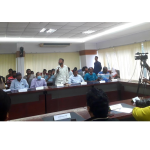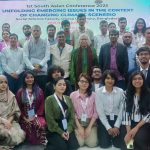The 39th G7 summit will be held in Hiroshima, Japan from 19 to 21 May 2023. The world’s seven largest economy countries – Canada, France, Germany, Italy, The United Kingdom, The United States, and Japan, have agreed to phase out international financing of carbon-emitting coal projects by the end of 2021 and meet the goal of achieving net zero emissions by 2050 from all fossil fuels under Paris agreement and agreed to stop investment. But the Japanese government and government agency JICA have kept these projects in the name of advanced technology. In front of the Khulna Press Club, a discussion was organized under the initiative of Bangladesh Working on External Debt (BWGED) and Coastal Livelihood and Environmental Action Network (CLEAN) on May 8, 2023. In the discussion, the speakers said that the developed countries of the world including Japan are putting the burden of debt on the shoulders of poor countries like us by investing in fossil fuels. As a result, the power plant has to pay 1,32,668.20 crore taka ( 16 billion dollars) in capacity charge(capacity remuneration). The award for the fiscal year 2022-23 will be around TK 23,000 crore taka ($2.12 billion). Hasan Mehedi, Member Secretary, Bangladesh Working Group on External Debt. (BWGED) said, the Institute of energy economics, (IEEJ) stated that Bangladesh is currently preparing the integrated energy and power master plan (IEPMP) for Bangladesh with the assistance of Japan’s international cooperation agency (JICA) focusing on imported coal and liquefied natural gas. Bangladesh is facing a serious shortage of fossil fuels. The country’s current peak power demand is 15,648 MW (April 19, 2028), but grid-connected capacity is 24,143 MW as of( may 15,2023) resulting in 8495 MW power plants sitting idle throughout the year which is 54.3% of the total demand. The experts said to investing in solar and wind power to relieve from this crisis. Speakers also stated that the planned IEPMP has the impact of bringing unreliable imported liquid hydrogen ammonia and carbon conservation technology in the guise of improved clean energy technology, which is destructive to the country’s economy. In addition, the draft plan calls for using 17.1% of renewable energy by 2050, compared to 32.8% of so-called sophisticated technologies, 30.7% of fossil fuels (mostly coal and LNG), and 30.7% of renewable energy. Bangladesh has a lot of potential in developing renewable energy projects. This requires proper planning and investment. According to the Bangladesh sustainable and renewable energy development authorities’ draft solar energy plan, there is enough space to install 25,000 to 40,000 MW of solar power plants by 2041. Mujib Climate Prosperity Plan (MCPP) in September 2021, and on 27 February 2023, the Cabinet approved it to implement. MCPP targets implementing 30% Renewable Energy in the energy mix by 2030, 50% by 2041, and 100% by 2050.
Developed countries should help developing countries with newer technologies to functionalize the adaptation and mitigation strategies
“Climate change vulnerability should be addressed minutely and policies should be taken keeping in mind the success of implementation, experts say” Indian Institute of Sustainable Development (IISD) and Carbon Minus India, New Delhi in collaboration with the Department of Rural Studies, Tripura University organized North Eastern Regional Sustainability Dialogue – a Pre-Summit for the Global Sustainability Summit (GSS, 2023) (http://gss2023.iisdindia.in) on 19th May 2023 at Tripura University. Unity of Nation Action for Climate Change Council (UNAccc) and North East Training Research and Advocacy Foundation (NETRA Foundation) were partners for the event. Around 100 students, scholars, and faculties from Tripura University and the University of Science and Technology, Meghalaya participated and interacted with the speakers in the dialogue. Professor Ganga Prasad Prasain, Vice-Chancellor, of Tripura University emphasized on adoption of a new education policy and the creation of jobs. He also emphasized the development of ecotourism as a scope of development of the North East Region. Professor Prasain highlighted the protection of forests of the region in the process protects the climate. From IISD, Dr. Manindra Tiwari enlightened the audience by delivering how north East region can contribute to sustainability. He opined that India has become a major power in climate change mitigation and adaptation. It is the developed countries that need to come forward and help the developing countries to achieve the newer technologies and functionalize the adaptation and mitigation strategies. The initiation of the Global Climate Facility shall be implemented through the provision of a Green Climate Fund, Special Climate Change Fund, etc. Prof. Sabyasachi Dasgupta, Department of Forestry raised certain pertinent questions and for the development of the Northeastern part of India, SDG 15 is especially important. He emphasized the rich biodiversity of the North East that includes cultural diversity and how this unique biodiversity contributes to the alleviation of poverty. Shri Sushanta Banik, Scientific Officer, Department of Science, Technology, and Environment, Government of Tripura opined that emphasis should be given to climate vulnerability, focusing on the risk of climate, such as extreme weather events, erratic rainfall, melting of glaciers, etc. The senior correspondent of the Times of India Shri Biswendu Bhattacharjee opined that ban on single-use plastic, and less usage of water is more in policy than in practice. He also opined that sustainable development is not person-specific or country specific but rather global. Dr. Selim Reza from INBAR, Ethiopia presented that bamboo is directly related to the seven SDGs. He mentioned in his speech that bamboo has cultural value; value from biodiversity along with enormous carbon sequestration capacity at both below ground level and above ground level and it can reduce carbon from the atmosphere at a very fast rate. Additional Project Officer Shri Atanu Saha informed us about the functioning of the INDO-GERMAN project. He mentioned that as part of the CREFLAT project toward addressing the issues related to climate change in Tripura. He also opined that women are a very important part of the project and people’s decision is important through which they try to capture traditional knowledge. Associate Professor Dr. Anirban Guha, from the Physics Department of Tripura University, thought that to cater to the problem of climate change, interdisciplinary research is of significant importance. In his speech, Dr. Saptarshi Mitra mentioned that though the steps shall be started at the ground level, the policy has an important role to play to achieve success in addressing issues related to climate change. He has opined that emphasis has been given to having more hydro-power, but the hydro-electric projects are changing the courses of rivers which may have significant implications in the future. He mentioned the example of Sikkim to support his argument. The session chair Shri. D. Radhakrishna, Chairman, Tripura Electricity Regulatory Commission of Tripura summed up the entire session by opining that climate change vulnerability should be addressed minutely and policies should be taken keeping in mind the success of implementation. The dependence on fossil fuels has to be reduced over time and in this regard, conservation projects are going to be significantly crucial. Dr. Samrat Goswami, Assistant Professor, Department of Rural Studies. offered a vote of thanks to the participants and each of the speakers and dignitaries presents in the discussion and dialogue. At the welcome address Dr. Jayanta Choudhury, HoD (In-charge), Department of Rural Studies, Tripura University. Dr. Choudhury also informed that 2 (two) Youth Climate Ambassadors would be selected from the North-Eastern States and be recognized at GSS, 2023 on 17th June at Vigyan Bhawan, New Delhi. �











